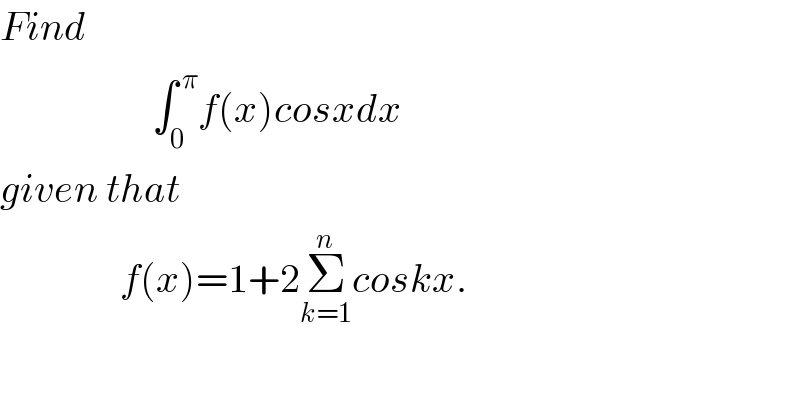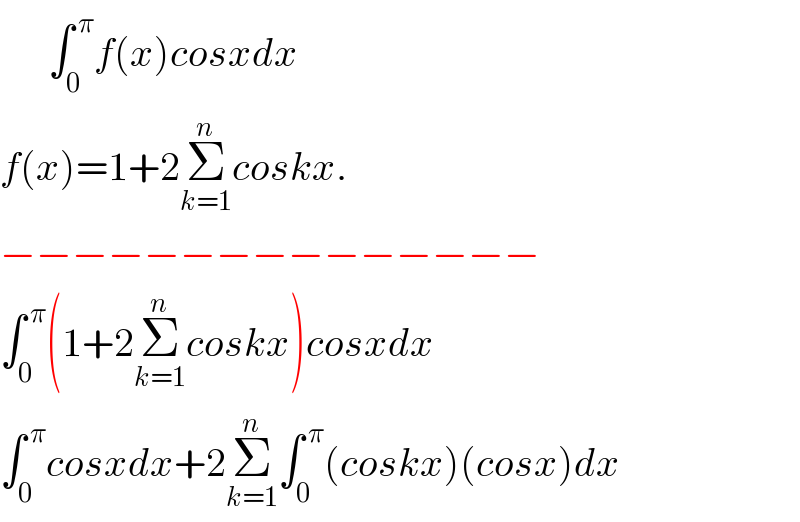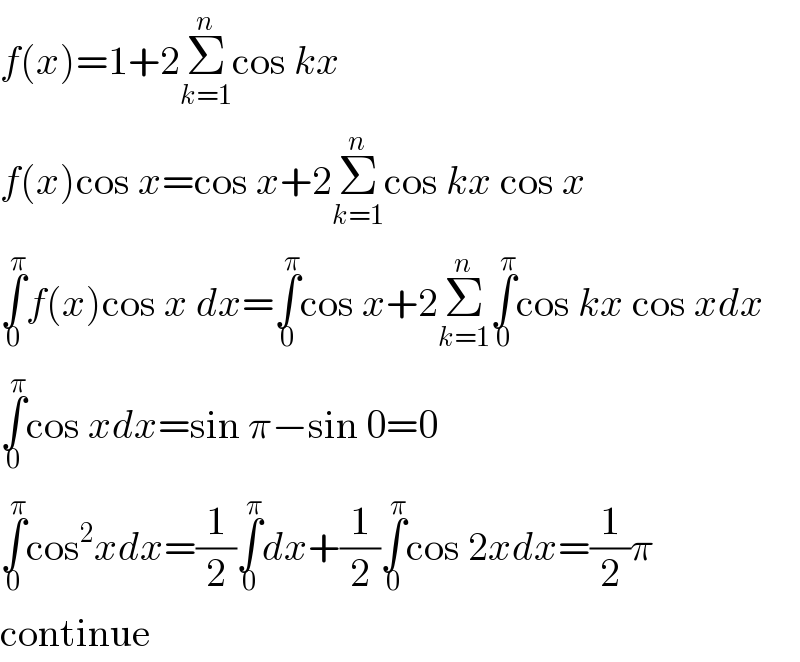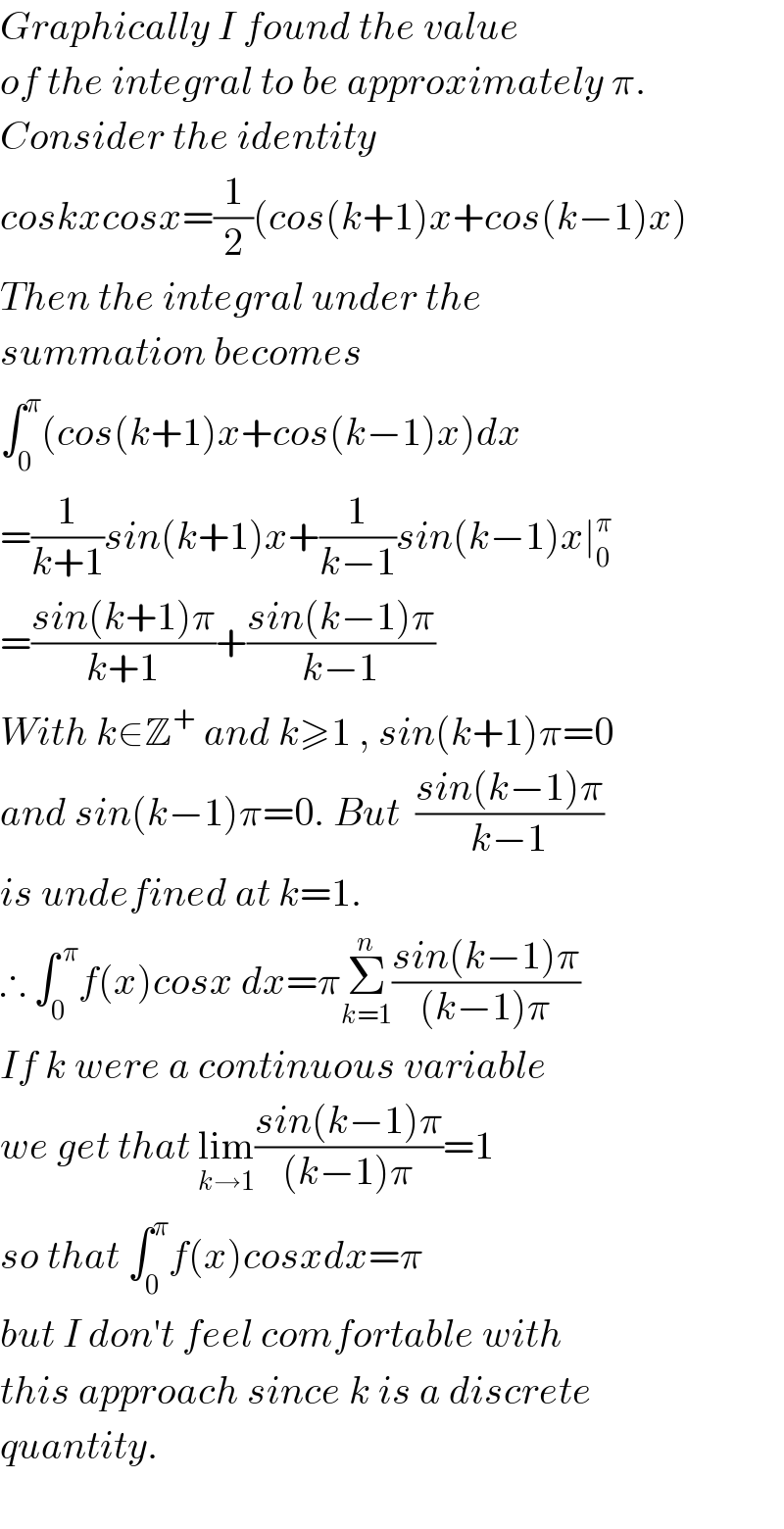
Question Number 1780 by 112358 last updated on 23/Sep/15

$${Find}\: \\ $$$$\:\:\:\:\:\:\:\:\:\:\:\:\:\:\:\:\:\:\:\int_{\mathrm{0}} ^{\:\pi} {f}\left({x}\right){cosxdx} \\ $$$${given}\:{that}\: \\ $$$$\:\:\:\:\:\:\:\:\:\:\:\:\:\:\:{f}\left({x}\right)=\mathrm{1}+\mathrm{2}\underset{{k}=\mathrm{1}} {\overset{{n}} {\sum}}{coskx}.\: \\ $$
Commented by Rasheed Soomro last updated on 23/Sep/15

$$\:\:\:\:\:\:\int_{\mathrm{0}} ^{\:\pi} {f}\left({x}\right){cosxdx} \\ $$$${f}\left({x}\right)=\mathrm{1}+\mathrm{2}\underset{{k}=\mathrm{1}} {\overset{{n}} {\sum}}{coskx}.\: \\ $$$$−−−−−−−−−−−−−−− \\ $$$$\int_{\mathrm{0}} ^{\:\pi} \left(\mathrm{1}+\mathrm{2}\underset{{k}=\mathrm{1}} {\overset{{n}} {\sum}}{coskx}\right){cosxdx} \\ $$$$\int_{\mathrm{0}} ^{\:\pi} {cosxdx}+\mathrm{2}\underset{{k}=\mathrm{1}} {\overset{{n}} {\sum}}\int_{\mathrm{0}} ^{\:\pi} \left({coskx}\right)\left({cosx}\right){dx} \\ $$
Answered by 123456 last updated on 24/Sep/15

$${f}\left({x}\right)=\mathrm{1}+\mathrm{2}\underset{{k}=\mathrm{1}} {\overset{{n}} {\sum}}\mathrm{cos}\:{kx} \\ $$$${f}\left({x}\right)\mathrm{cos}\:{x}=\mathrm{cos}\:{x}+\mathrm{2}\underset{{k}=\mathrm{1}} {\overset{{n}} {\sum}}\mathrm{cos}\:{kx}\:\mathrm{cos}\:{x} \\ $$$$\underset{\mathrm{0}} {\overset{\pi} {\int}}{f}\left({x}\right)\mathrm{cos}\:{x}\:{dx}=\underset{\mathrm{0}} {\overset{\pi} {\int}}\mathrm{cos}\:{x}+\mathrm{2}\underset{{k}=\mathrm{1}} {\overset{{n}} {\sum}}\underset{\mathrm{0}} {\overset{\pi} {\int}}\mathrm{cos}\:{kx}\:\mathrm{cos}\:{xdx} \\ $$$$\underset{\mathrm{0}} {\overset{\pi} {\int}}\mathrm{cos}\:{xdx}=\mathrm{sin}\:\pi−\mathrm{sin}\:\mathrm{0}=\mathrm{0}\: \\ $$$$\underset{\mathrm{0}} {\overset{\pi} {\int}}\mathrm{cos}^{\mathrm{2}} {xdx}=\frac{\mathrm{1}}{\mathrm{2}}\underset{\mathrm{0}} {\overset{\pi} {\int}}{dx}+\frac{\mathrm{1}}{\mathrm{2}}\underset{\mathrm{0}} {\overset{\pi} {\int}}\mathrm{cos}\:\mathrm{2}{xdx}=\frac{\mathrm{1}}{\mathrm{2}}\pi \\ $$$$\mathrm{continue} \\ $$
Commented by 112358 last updated on 29/Sep/15

$${Graphically}\:{I}\:{found}\:{the}\:{value} \\ $$$${of}\:{the}\:{integral}\:{to}\:{be}\:{approximately}\:\pi. \\ $$$${Consider}\:{the}\:{identity} \\ $$$${coskxcosx}=\frac{\mathrm{1}}{\mathrm{2}}\left({cos}\left({k}+\mathrm{1}\right){x}+{cos}\left({k}−\mathrm{1}\right){x}\right) \\ $$$${Then}\:{the}\:{integral}\:{under}\:{the}\: \\ $$$${summation}\:{becomes} \\ $$$$\int_{\mathrm{0}} ^{\pi} \left({cos}\left({k}+\mathrm{1}\right){x}+{cos}\left({k}−\mathrm{1}\right){x}\right){dx} \\ $$$$=\frac{\mathrm{1}}{{k}+\mathrm{1}}{sin}\left({k}+\mathrm{1}\right){x}+\frac{\mathrm{1}}{{k}−\mathrm{1}}{sin}\left({k}−\mathrm{1}\right){x}\mid_{\mathrm{0}} ^{\pi} \\ $$$$=\frac{{sin}\left({k}+\mathrm{1}\right)\pi}{{k}+\mathrm{1}}+\frac{{sin}\left({k}−\mathrm{1}\right)\pi}{{k}−\mathrm{1}} \\ $$$${With}\:{k}\in\mathbb{Z}^{+} \:{and}\:{k}\geqslant\mathrm{1}\:,\:{sin}\left({k}+\mathrm{1}\right)\pi=\mathrm{0} \\ $$$${and}\:{sin}\left({k}−\mathrm{1}\right)\pi=\mathrm{0}.\:{But}\:\:\frac{{sin}\left({k}−\mathrm{1}\right)\pi}{{k}−\mathrm{1}} \\ $$$${is}\:{undefined}\:{at}\:{k}=\mathrm{1}. \\ $$$$\therefore\:\int_{\mathrm{0}} ^{\:\pi} {f}\left({x}\right){cosx}\:{dx}=\pi\underset{{k}=\mathrm{1}} {\overset{{n}} {\sum}}\frac{{sin}\left({k}−\mathrm{1}\right)\pi}{\left({k}−\mathrm{1}\right)\pi} \\ $$$${If}\:{k}\:{were}\:{a}\:{continuous}\:{variable} \\ $$$${we}\:{get}\:{that}\:\underset{{k}\rightarrow\mathrm{1}} {\mathrm{lim}}\frac{{sin}\left({k}−\mathrm{1}\right)\pi}{\left({k}−\mathrm{1}\right)\pi}=\mathrm{1} \\ $$$${so}\:{that}\:\int_{\mathrm{0}} ^{\pi} {f}\left({x}\right){cosxdx}=\pi \\ $$$${but}\:{I}\:{don}'{t}\:{feel}\:{comfortable}\:{with} \\ $$$${this}\:{approach}\:{since}\:{k}\:{is}\:{a}\:{discrete} \\ $$$${quantity}. \\ $$$$ \\ $$
